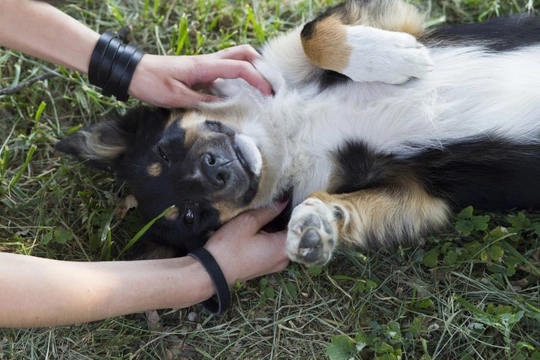
Can dogs be ticklish?
Most people have a ticklish spot somewhere on their bodies whether they enjoy being tickled or not, and dog owners often wonder if the same is true for their pets. Like people, most dogs have specific preferences about where they like to be touched and the type of pressure that they enjoy, and other areas that they might try to hide or prefer not to be touched on.
It is wise to get to know where and how your dog likes you to pet them and to avoid touching them in ways that annoy them or that they don’t actively enjoy, and this means reading their cues and responding to the signals that they give to you when you are touching them.
Some dogs will also react in funny and even comical ways when you scratch or pet them in a certain spot – like dogs that will furiously paddle their legs if you scratch a certain spot on their bellies!
This means that many dog owners wonder if their dogs are ticklish in a certain spot on their bodies, and if so, whether they enjoy being tickled or find it annoying or even stressful. In this article we will answer the question of whether or not dogs can be ticklish, and whether or not dogs enjoy being tickled. Read on to learn more.
What is a tickle?
The way that we react when we are tickled is what is known as an involuntary reaction – whether we laugh, flinch, or move furiously to get away, this response is something that we have little to no control over.
Certain types of touch in certain areas of the body produce a ticklish sensation that may be either annoying or pleasurable, and this is true for your dog as well. The reactions that your dog displays if you hit a ticklish spot can be just as variable as they are in people, ranging from those flexing legs if you scratch a certain spot on the belly, to scrabbling to move out of reach, to rolling around and being silly because the dog is having a good time!
Yes dogs certainly can be ticklish and many are, but they don’t tend to have as many ticklish spots as people – and some dogs don’t really have any ticklish spots at all, or are very good at hiding them or avoiding being touched on them!
Where are dogs most likely to be ticklish?
As mentioned, not all dogs are ticklish and every dog that is will likely have different areas that trigger their tickle responses! However, there are a few areas of the dog’s body that are likely to be more ticklish than others, and these might include their lower flanks and belly, the base of the tail, and the centre of the chest between the dog’s front legs.
You may of course find that none of these spots provoke a reaction in your dog, or that their ticklish spots are somewhere else entirely.
Do dogs like being tickled?
Just as is the case with people, whether or not any given dog likes being tickled comes down to their personal preferences. Additionally, how and where any dog likes to be tickled (or not) can be variable too, and some dogs will love being tickled in one spot but not in another.
If your dog allows you to tickle them and does not react badly, try to get away, and shows signs of enjoying it (like silly behaviour, a furiously paddling paw, or a happily wagging tail) you can be pretty sure that the dog is having a good time.
If, on the other hand, your dog retreats or tries to get away, hides or covers the area you are petting or even growls or otherwise sends a warning signal to get you to back off, they’re not enjoying your attentions and you should stop what you are doing and allow your dog to retreat.
It is also important to bear in mind that any dog or person will only tolerate and enjoy being tickled for a certain amount of time before it will become annoying and overstimulating, before they back off or otherwise indicate that they have had enough.
If your dog isn’t in the right mood or the touch isn’t pleasant to them at that point, they won’t be keen on being tickled, even if at other times they actively enjoy it.
Always watch your dog’s responses and behaviour and take your cues from them, to ensure that you don’t annoy or wind your dog up, or even risk injury because your dog snaps in order to get away.
Always ensure that your dog can get up and back off whenever they want to, and allow them the space to do this without going after them.



